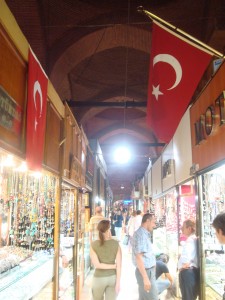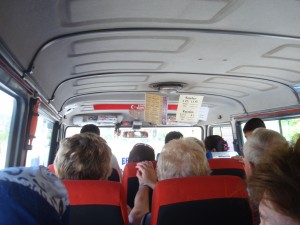Whenever we arrive in a new country, our guard is always up. We encounter a new people with a new language, new rules and laws, and new social customs. We’re never certain whether as foreigners we’ll be welcomed with open arms, seen as walking dollar signs, or rejected as just another Western tourist on vacation.
Arriving in Kusadasi and having not slept much in the previous 24 hours, our guard was high, especially after we were met at the port by a Turkish “official” who collected a 10 Euro “port tax” from each of us, cash only, no receipt issued. After getting through customs (another $20 USD each for a visa, cash only, no Turkish Lira accepted), we began the process of figuring out how to get to our hotel in Selcuk, about 15 miles north.
We simply had planned to take a taxi, which we figured would cost about $20, but were surprised to learn that it would cost us closer to 50 Euro. Ouch. Time to find an alternative.
We head to the port’s TIC (tourist information center), which is kind enough to give us a map and show us where we can catch a dolmus (local minibus) about 200 meters away, which will take us to the center of Selcuk, only about 200 meters from our hotel for about $3 each. Great!
We set off with our 70+ pounds of travel gear on our backs in search of the dolmus pickup location, following the map we had been given. After about 200 meters of walking in the direction of the dolmuses, we find ourselves in the Kusadasi Bazaar. If you’ve never been to a Turkish bazaar, it’s about what you would imagine: Turkish carpets sold on every corner, plus tea trays and ceramics and glass lanterns and leather goods and sunglasses and kebab restaurants and everything made in Turkey or China available for your purchase, and everyone vying for your attention and your wallet as you walk by.
Tired and in no mood for buying or bargaining, we approach one of the shops and ask for directions to the dolmus pickup. A kind shopkeeper takes pity on us, and rather than trying the hard sell on us, points the way to the station, just another 200 meters ahead. We thank him and set out in generally the same direction we had been heading earlier, but with greater confidence than before.
At this point, we notice that a group of four English-speaking, middle-aged tourists are roughly following our same path, and asking very similar questions to our own. We approach this group and learn that they had just gotten off the Celebrity Equinox cruise ship that was in port, and are making their way to the dolmus station so they can visit Ephesus for the day on their own, rather than sign up for the ~$100 a head guided tour offered on board the ship, and be rushed through by a guide. Partners in crime now, we head together toward the dolmus pickup point.
About 200 meters later, we find a street sign that we can decipher, and cross reference it on our map. More than half a kilometer from the port now, we have traveled about one third of the way to the dolmus pickup location.
Still unwilling to pay 50 Euro for a taxi, we trudge on toward the location that we can now make out on the map, chatting with the travelers we have just met. We soon discover that these travelers are from a small town in Scotland near Glasgow where Allie’s sister Jenny is in vet school, and even had hosted a student from the Glasgow Vet program during lambing season.
Our conversation helps the walk fly by, and we soon find ourselves across the street from the dolmus pickup point, when a taxi driver (sensing his imminent loss of potential business) offers all six of us a ride to Ephesus and then on to Selcuk for $30 total. Since the dolmus is expected to cost about $3 each, $30 for six of us for a private taxi seems reasonable, and discussions began with the taxi driver. As we prepare to enter the cab, the driver confirms that it will only cost us $10 each for the ride. Huh? Trigonometry may have been invented just 10 miles from where we were standing, but basic math skills seem to need some improvement. We break off our discussions with the taxi driver and cross the street, finding a group of mostly locals waiting for dolmuses to various locations in the area.
A very helpful dolmus master (for lack of a better title!) advises us to wait here for just a few minutes, then helps us get our bags and ourselves onto the dolmus. Soon we all were speeding north toward Selcuk and Ephesus, watching with amusement mixed with unease as the driver turns to his passengers to collect the 4TL (Turkish Lira) fee for the ride, then counts out change, all while speeding along the winding 2-lane mountainous road.
At last, we arrive at Ephesus and bid our brief Scottish friends farewell, then continue on the short distance to Selcuk, where we are dropped at the bus station.
According to our hotel’s online brochure, we are just 200 meters from our first bed in nearly 36 hours as we stand in the middle of the bus station parking lot, but which way is the hotel, and how will we get there?
A 20-something man approaches from a booth in the station and asks if we would like to take any tours. As the only tour we want at this point is the one that lead us directly to our bed, we decline his offer, but ask if he knows where the Urkmez Hotel is located. He offers to call the hotel and have them pick us up. Alarm bells sound in our heads. We’re supposedly only 200 meters from the hotel, we’re painfully tired, in a brand new country the rules and customs of which we do not yet know, and this man expects us to get into an unmarked car with all our possessions and trust that this car will take us to the hotel, and not out to some distant mountain hideaway where unsuspecting tourists are separated from their belongings and god knows what else. Or more likely, we’d wind up a similarly named hotel like “Ukmez” that happens to be run by his brother-in-law.
We poke our head into a nearby shop and ask for a map, but have no luck. We find another man who also offers to call the hotel and arrange a pickup. Must be a conspiracy.
Two minutes later, an unmarked van shows up, and offers to take us to the Urkmez Hotel. Allie and I look at each other, weigh our options, size up the driver, and get in the van. 60 seconds and 200 meters later, we arrive at our hotel, check in and are sound asleep before our heads hit the pillow.
As our travels through Turkey progress, we discover that what we encountered in our first few moments in the country was a microcosm of our greater experiences with Turkish culture. Turks are unequivocally a hospitable people. Many times in our travels, we would be offered directions or assistance, and even driven from one place to the next out of goodwill, with no expectation of compensation.
We also learned that Turks are an enterprising lot. From the bazaars of Kusadasi and Istanbul, to the small street stalls selling peaches and other backyard-grown produce, to every restaurant owner and leather shop partnering with tour bus operators for a share of their business, Turks find ways to thrive in a land in which the rules are very different from those at home. Discovering and understanding these mores, and learning how to engage the locals under these rules is exhilarating, and one of the reasons we so love to travel.


{ 4 comments… read them below or add one }
just reading about it makes me tired. reminds me of cambodia.
Yeah, we were worthless by the time we got to the hotel. It’s times like this I’m glad our packs aren’t too heavy!
Much better than bed bugs! I love reading about your adventuring! What an experience.
Thanks Wendy! Tired legs beat bed bug bites any day :^)